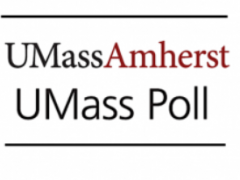Topline results and crosstabs for the poll can be found at www.umass.edu/poll
Fears of rising inflation, a tight and more expensive housing market and an unstable economy dominate the concerns of Massachusetts residents, who increasingly view both the nation and the commonwealth on the wrong track, according to the results of a new University of Massachusetts Amherst / WCVB Poll released today.
Image

The poll of 1,000 Massachusetts respondents, conducted between June 15-21, found that 78% say the national economy is only “fair” or “poor,” with 57% feeling likewise about the Bay State’s economy. Nearly 6 in 10 respondents (58%) view their own personal economic situation as “fair” or “poor,” as well. These negative views show marked increases from a November 2021 UMass Poll, which found the most optimistic views of the economy since the COVID pandemic struck in early 2020.
“What a difference a year makes,” says Tatishe Nteta, associate professor of political science at UMass Amherst and director of the poll. “Last year when asked to identify the most pressing issue facing the commonwealth, the overwhelming majority of residents pointed to the challenges associated with the COVID-19 pandemic. Today, with inflation reaching a 30-year high, gas prices hovering at a record $5 a gallon and the nation on the brink of a recession, citizens of the commonwealth now have the economy on their minds as the top five most pressing problems identified in our poll were inflation, housing, prices, the economy and gas.”
Image

“Massachusetts residents are feeling the current inflation crunch,” says Jesse Rhodes, professor of political science at UMass Amherst and associate director of the poll. “A strong majority rate their own economic situation negatively, and the high price of housing, gas and food are among their top concerns. As we go into election season, people are feeling uncertain and unsettled. The current economic turmoil is shaking Massachusetts residents’ confidence in the direction of the state, but their view of national politics is even more bearish, with two-thirds believing that the nation is headed in the wrong direction.”
Only 18% of the poll’s respondents say the nation is headed in the right direction, while more than double – 40% – say the same about the direction of Massachusetts, slightly higher than the 38%, who say things in the commonwealth “have gotten pretty seriously off on the wrong track.”
Gov. Baker’s Swan Song Ending on a High Note
Driving the more positive perception of the state may be the views of respondents toward outgoing Gov. Charlie Baker, who receives his highest approval marks in nearly two years. Baker, who has declined the opportunity to seek a third term, currently holds a 60% approval rating, his highest since an Oct. 2020 UMass Poll pegged him at a stellar 68% approval.
Image

“Baker can leave the public stage feeling good, as 69% say he met or exceeded expectations as governor, and just 17% say that Massachusetts is worse off than it was before he became governor,” says Raymond La Raja, professor of political science at UMass Amherst and associate director of the poll. “Across a range of issues he gets high marks, but especially for the pandemic, with 68% saying he handled that well.”
Baker’s approval ranks higher than that of the presumptive Democratic nominee for governor, Attorney General Maura Healey, whose 46% approval rating is down from 59% in October 2020 and 48% in November 2021, as well as those of Senators Elizabeth Warren (52%) and Edward Markey (49%), and the state Legislature (50%).
“As Gov. Baker heads for the exits, he remains one of – if not the – most popular figures in the state,” Rhodes says. “Although two-thirds of Massachusetts residents view Baker as a middle-of-the-road to conservative figure – not necessarily an advantage in the nation’s most liberal state – they appreciate his willingness to work with the state Legislature and get things done.”
“The reports of the demise of Gov. Baker’s popularity may have been exaggerated,” Nteta echoes. “After experiencing a dip in approval during the COVID-19 pandemic, Baker, a Republican governor in one of the bluest states in the nation, has once again assumed his position as the most popular statewide elected official in the commonwealth. His popularity extends across political and demographic groups, and even a majority of his most vocal critics, Republicans and Trump voters, express approval of the job the governor is doing.”
Masks, Gay Marriage, Sports Gambling, Legislative Policies and Election Issues
The survey also asked respondents their views on numerous COVID-19, election and legislative issues.
Image

The poll’s respondents were nearly evenly split over whether the state should reintroduce public mask mandates over two years after the start of the COVID-19 pandemic, with 37% supporting the mandate’s return and 40% in opposition, with the remaining 23% unsure or indifferent.
With the Supreme Court’s decision in Dobbs v. Jackson Health Clinic prompting talk that it could open the door for a revocation of gay marriage rights, 82% of the poll’s respondents affirmed their support for such rights for the LGBT community. The 18% in opposition is about half of the national number revealed in a national UMass Poll from a few weeks ago, which found over one-third (35%) of Americans overall, 60% of Republicans and 67% of conservatives continue to oppose allowing gays and lesbians to legally marry.
The poll asked about gun rights, as well, another issue recently impacted by a potentially landmark Supreme Court decision in New York State Rifle & Pistol Association, Inc. v. Bruen. “While the Supreme Court is expanding gun rights, Massachusetts residents are moving in the opposite direction,” Rhodes explains. “A strong majority (56%) would support legislation that would allow victims of gun violence to bring lawsuits against manufacturers and distributors if a firearm was used in a crime. Reflecting concern about the epidemic of mass shootings, Massachusetts residents want to continue to shore up the state’s gun laws.”
The survey also found that more respondents (46%) oppose the new law allowing immigrants without legal status to apply for a standard state driver’s license beginning July 1, 2023 – enacted via a recent override of Baker’s veto – than approve of it (40%). “Despite its reputation as the nation’s most liberal state, there are limits to Massachusetts residents’ liberalism,” Rhodes says. “A plurality of residents opposes legislation that would allow undocumented immigrants to be eligible for a driver’s license in the state.”
La Raja similarly notes that, “While Massachusetts voters tend to be more liberal than elsewhere, they are not necessarily opposed to cutting taxes in some circumstances, as well. For example, 71% of the poll’s respondents like the idea of temporarily suspending the state gas tax. And while we have also found that many want to add a wealth tax for high income earners, a majority (57%) thinks it is OK to allow heirs to keep as much as $2 million of their inheritance tax-free, compared to the present level of $1 million.”
However, he adds that a majority (62%) also supports the construction of a high-speed rail service between Springfield and Boston, with just 12% opposed, and 26% do not have a strong opinion. “If Massachusetts officials think this is a good idea, there is certainly public support for it,” La Raja says. “Being from the Springfield area, I personally like the idea of taking the train to a Red Sox game and pasta dish in the North End.”
Nearly all election reforms surveyed by the UMass team garnered majority support, including making Election Day a state holiday (71%), making permanent the option of voting by mail (63%), allowing same-day registration on Election Day (62%) and during early voting (63%), and allowing election officials to automatically mail absentee ballot applications to all voters (53%).
“Given one-party dominance in Massachusetts, it is probably not surprising that voters appear to favor some changes to primary elections,” La Raja says. “A majority also approves having rank-choice voting (51%), while a near majority (48%) likes the idea of having candidates from all parties compete in the same primary and then the top two move to the general election, like they do in California.”
“Regarding education-related issues, as the Massachusetts Legislature debates whether to lengthen the temporary extension of the free lunch program available to all K-12 students in the state, close to three quarters (73%) of the state’s residents support making this program permanent,” Nteta says. “Meanwhile, as parents and school committees around the nation continue to vociferously debate whether students in public schools should be taught the history of race in the U.S., here in the commonwealth a majority (53%) of its residents not only express support for the Juneteenth holiday but are also supportive of teaching the history and significance of Juneteenth in the public schools (60%).”
Asked about their views on sports gambling, a plurality (42%) of those surveyed indicated support for its legalization in Massachusetts, with one-quarter (25%) opposed and one-third (33%) unsure. However, relatively few respondents indicated an actual interest in betting on sports should it be legalized. Betting on the NFL held the most interest, with slightly more than one-quarter (26%) saying they would probably or definitely wager on pro football. Interest in other sports, both professional and collegiate, varied from 16 to 21%.
“Although only one-fifth would place bets if sports gambling were legalized in the commonwealth, more than 40% of residents support legalization and another third have mixed views,” Rhodes says. “Meanwhile, only 11% strongly oppose legalization. Given these numbers, it seems quite possible that a majority may come around to supporting legalization, especially if advocates mount a campaign.”
Finally, the use of Native American imagery, both by sports teams and in the Massachusetts state seal, was polled, as well. “Massachusetts residents are deeply divided over what, if anything, to do about the use of Native American images and symbols,” Rhodes says of the poll’s findings, which are nearly evenly split on the issue. “This divide reflects broader societal divisions about how to reckon with the nation’s history of colonialism and genocide against native populations. Does representing Native Americans on everything from the state flag to a high school mascot represent a sign of respect, or is it evidence of exploitation? Opinions are polarized, with both sides clinging to their views passionately.”
Methodology
This University of Massachusetts Amherst / WCVB Poll of 1,000 Massachusetts respondents was conducted by YouGov June 15-21. YouGov interviewed 1,131 total respondents who were then matched down to a sample of 1,000 to produce the final dataset. The respondents were matched to a sampling frame on gender, age, race and education. The frame was constructed by stratified sampling from the full 2019 American Community Survey (ACS) one-year sample with selection within strata by weighted sampling with replacement, using the person weights on the public use file.
The matched cases were weighted to the sampling frame using propensity scores. The matched cases and the frame were combined and a logistic regression was estimated for inclusion in the frame. The propensity score function included age, gender, race/ethnicity and years of education. The propensity scores were grouped into deciles of the estimated propensity score in the frame and post-stratified according to these deciles.
The weights were then post-stratified on 2016 and 2020 Presidential vote choice, own/rent, gender, age, race and education to produce the final weight.
The margin of error within this poll is 3.5%.








